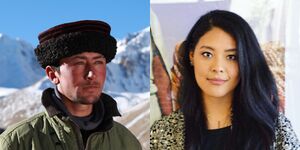Agnean people: Difference between revisions
No edit summary |
|||
| Line 44: | Line 44: | ||
==Genetics== | ==Genetics== | ||
The modern Agnean people are further distinguished from the [[Tokhari people|Tokhari]] population by their genetics, having a much lower frequency of eastern Eurasian haplogroups and a much higher frequency of {{wpl|Haplogroup R1a}}, specifically {{wpl|Haplogroup R1a#Central Asia|R1a1a}}, occurring at a rate of about 64%. | The modern Agnean people are further distinguished from the [[Tokhari people|Tokhari]] population by their genetics, having a much lower frequency of eastern Eurasian haplogroups and a much higher frequency of {{wpl|Haplogroup R1a}}, specifically {{wpl|Haplogroup R1a#Central Asia|R1a1a}}, occurring at a rate of about 64%. Mitochondrial DNA samples from the Agnean population show a very unusually high frequency of western Eurasian mtDNA haplogroups — including the very rare {{wpl|Haplogroup U (mtDNA)#Haplogroup U4|Haplogroup U4}}, which occurs at a rate of about 34% among Agneans. | ||
Revision as of 18:22, 26 May 2019
Agniyi 烏孫 | |
|---|---|
 | |
| Total population | |
| 126,146 (2015) | |
| Regions with significant populations | |
Korlâ Prefecture, Loulan | 126,146 |
| Languages | |
| First language Neo-Tocharian Second language Tokhari, Mandarin | |
| Religion | |
| Folk religion, Buddhism | |
| Related ethnic groups | |
| Izilakhs, Tokharis | |
The Agneans (Agniyi, singular Agniya) are an ethnic group native to the Kaidu River valley in Hejing County, located within Korlâ Prefecture, Loulan, who speak the Neo-Tocharian language. They are very closely related to the neighbouring Tokharis, and their language is likely descended from the vernacular of the Loulan Kingdom prior to the kingdom's cultural and linguistic Persianisation. A sizeable Agnean population exists in the city of Qara-Shahr, which in the Agnean Neo-Tocharian language is called Agni.
History
The Agnean people share much of their history with the Tokhari people, who didn't distinguish themselves culturally and linguistically from the Agneans by their adoption of the Persian language until the high middle ages. The ancestors of the modern Agnean and Tokhari people are known as the Tocharians.
Culture
Religion
Genetics
The modern Agnean people are further distinguished from the Tokhari population by their genetics, having a much lower frequency of eastern Eurasian haplogroups and a much higher frequency of Haplogroup R1a, specifically R1a1a, occurring at a rate of about 64%. Mitochondrial DNA samples from the Agnean population show a very unusually high frequency of western Eurasian mtDNA haplogroups — including the very rare Haplogroup U4, which occurs at a rate of about 34% among Agneans.